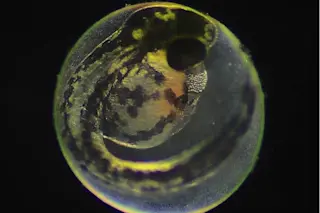Parents of angsty teens have almost certainly heard this line at least once: I didn’t ask to be born.
For fish embryos, communication about their impending birth appears quite the opposite. A report in Science details how fish-in-the-making play an active role in determining their delivery.
Such timing is crucial to baby fish — indeed, to all egg-laying species. Controlling one’s own hatch ensures that the embryo emerges as a newborn, fully developed and ready to face the challenges of the outside world.
Earlier studies have shown that fish embryos can detect environmental conditions that favor their survival after birth. But scientists didn’t understand how that message was sent, received, and acted upon.
Researchers in Israel uncovered the chemical communication fish embryos use to signal they are ready to face the world. Think of it as a dedicated telephone line — but with hormones flowing through it, rather than sound ...














